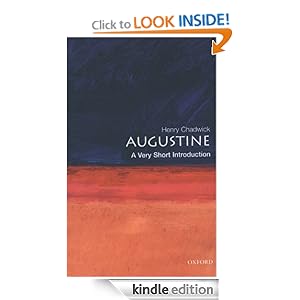 Summary: Augustine is very important to the the history of Christian thought and often misappropriated by all sides.
Summary: Augustine is very important to the the history of Christian thought and often misappropriated by all sides.
Augustine is not my favorite Christian thinker. I know this is partially because he is not incredibly accessible. And partially because I have not read that much of him, and there is a lot to read.
I read his Confessions in grad school. And I have read bits and pieces since. Chadwick says that is part of the problem with Augustine. Because Augustine wrote a lot, more than virtually any other of the church fathers prior to middle ages (or at least we have more of his writing than anyone else), there is a lot of material to mine for Augustine’s support of your favorite theological point.
There are three main points that I got out of this introduction. One, I have heard frequently that Augustine was anti-women. There is a lot of evidence to marshal for that position, but Chadwick says that Augustine was not anti-women, he was anti-sex. And much of his anti-sex position was really about the fact that he was concerned about his own weaknesses rather than being against sex as a whole. Augustine for a while advocated that pastors live apart from their wives in celibate community. This was not all that popular among the pastors he supervised. (Although it was part of the movement toward celibate priest.)
But like many other things, Augustine pulled back from his more extreme positions around sex as he aged. I am still uncomfortable with where he ended up around the nature of sex. I think this still influences a lot of Christian dualism that sees the body as bad (especially sex) even in appropriate contexts (like sex within marriage.) Augustine was not as extreme as many that came after him and many of them mis-used his writings to defend their positions. But even Augustine’s more moderate positions are still difficult to accept (like the biological transmission of sin to the child through sex). Admittedly I am not an expert here and I need to read more, but Chadwick seems to agree.
This book also confirms my positive feelings about Augustine’s desire to be pastoral. For all my disagreements with John Piper, I always appreciate that even when I disagree, I do not disagree with the fact that Piper is attempting to not just make a point, but he writes and works and argues because he is trying to be pastoral. That is clearly the case with Augustine. He did not want to get involved in many of the arguments of the day, but felt he needed to for pastoral reasons.
The third point is that came away from this book with is that Augustine was very much writing to a specific culture. He was seeped in Neo-Platonism and Manichaeism, and as much as critiqued those positions he did not completely reject them because they were so much a part of the very culture he was living in and ministering to. He is a good example of the fact that as much as we can be renewed by Christ, we are not removed from our culture. We always have blind spots. We modern Evangelicals can critique post-modernism, capitalism, individualism, etc., but we will never be free of those cultural currents.
On the whole this was a pretty readable introduction to Augustine. I got bogged down in the discussion of Neo-Platonism about 1/3 of the way through the book and I am sure I did not get the whole gist of Chadwick’s argument there, but the rest of the book I though was pretty clear and a good introduction.
Augustine: A Very Short Introduction Purchase Links: Paperback, Kindle Edition
(This is a kindle lendable book if you want to borrow my copy.)